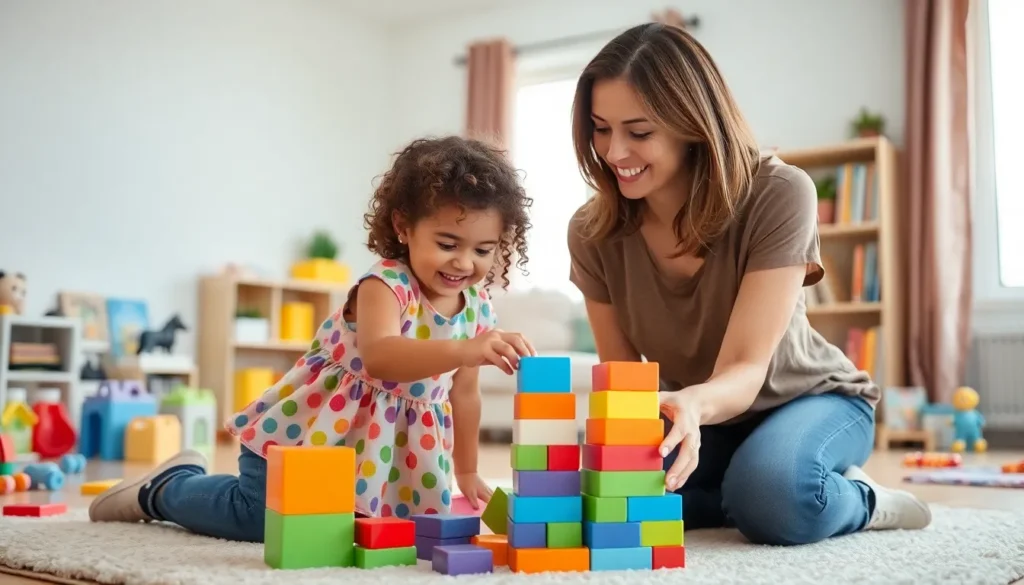Navigating the wild world of preschoolers can feel like trying to herd cats—adorable, chaotic cats with boundless energy and a knack for mischief. As parents, they often find themselves in a delightful yet challenging phase where tantrums and giggles coexist. It’s a rollercoaster ride of emotions, and every twist and turn brings new surprises.
Table of Contents
ToggleUnderstanding Preschool Development
Understanding preschool development is crucial as children transition from toddlers to preschoolers. This stage involves significant growth in various areas.
Key Milestones
Key milestones vary by child but generally include improvements in language, motor skills, and social interactions. By age three, children often express thoughts clearly, use simple sentences, and recognize familiar words. Fine motor skills develop as they master activities like drawing and stacking blocks. Social milestones are evident when children initiate play with peers and share. At age four, many children engage in cooperative play, starting to understand rules and social dynamics. Families might observe the emergence of imaginative play, where creativity flourishes. Overall, knowledge of these milestones helps parents gauge their child’s development effectively.
Importance of Play
Play serves as an essential component of preschool development. Through play, children learn cognitive skills like problem-solving and critical thinking. Social skills also grow as they navigate interactions with peers, forming friendships and learning teamwork. Physical play promotes coordination and strength, crucial for overall health. Engaging in various types of play, including pretend and constructive play, fosters creativity and emotional expression. Parents should encourage unstructured playtime, allowing children to explore their interests freely. Ensuring safe play environments creates opportunities for discovery and learning while supporting overall developmental growth.
Effective Communication Strategies

Effective communication plays a crucial role in parenting preschoolers. Understanding their needs and feelings helps to foster a supportive environment.
Active Listening Techniques
Active listening involves fully engaging with a child while they speak. Parents can use eye contact to show attentiveness. Nodding encourages children to continue sharing their thoughts. Repeating what the child says demonstrates understanding and helps clarify any misunderstandings. This practice also validates their feelings and boosts confidence. Redirecting the conversation back to the child’s interests often leads to deeper discussions. Ultimately, these techniques strengthen the parent-child bond and promote healthy communication.
Encouraging Expression
Encouraging expression allows preschoolers to articulate their feelings. Asking open-ended questions promotes thoughtful responses. Using prompts, like “What were your favorite parts today?” inspires them to share experiences. Providing art materials such as crayons and paper encourages creativity and helps express emotions visually. Setting aside dedicated time for conversations fosters a safe space for sharing. Celebrating their thoughts and feelings, regardless of the topic, validates their experiences. This approach nurtures emotional intelligence and builds confidence in communication skills.
Establishing Routines
Establishing routines plays a crucial role in the development of preschoolers. Recognizing the need for structure helps children feel secure and understand expectations.
Benefits of Consistency
Consistency instills a sense of safety for preschoolers. Familiar routines provide predictability, reducing anxiety in children. Structured schedules contribute to better behavior, as kids learn acceptable actions through repetition. Establishing regular meal, play, and bedtime markers promotes healthy habits that benefit physical and emotional development. Improved focus often results from knowing what comes next, allowing for smoother transitions throughout the day. Supportive environments create opportunities for children to thrive socially and emotionally, reinforcing their confidence in facing new challenges.
Tips for Creating a Daily Schedule
Creating an effective daily schedule requires thoughtful planning. Start by outlining key activities, such as meals, naps, and playtime. Incorporate flexibility within the schedule to accommodate children’s moods and needs, allowing for adjustments when necessary. Designate specific time slots for quiet and active play, ensuring a well-rounded experience. Involve preschoolers in the process, letting them contribute ideas to enhance their engagement. Use visual aids like charts or images, enabling children to easily identify their daily tasks. Consistently review and adjust the schedule based on what works best for the family, fostering a cooperative atmosphere that promotes learning and growth.
Positive Discipline Techniques
Positive discipline techniques guide parents in fostering respectful, understanding relationships with preschoolers. These methods emphasize teaching rather than punishing, focusing on long-term behavioral changes.
Redirection Strategies
Redirection strategies serve as effective tools for managing challenging behaviors. Instead of confronting a child directly, parents can offer alternative activities aligned with the child’s interests. For instance, if a child plays too roughly with toys, suggesting a quieter game can shift their focus. Additionally, diverting attention to a relevant task encourages positive engagement. Offering choices empowers preschoolers, helping them feel in control while steering them away from undesirable behavior. This approach not only prevents power struggles but also reinforces problem-solving skills.
Natural Consequences
Natural consequences provide valuable learning experiences for preschoolers. When children face the results of their actions, they develop a clearer understanding of boundaries. For example, if a child refuses to wear a jacket on a chilly day, feeling cold will encourage them to dress appropriately in the future. Parents can facilitate these moments by allowing safe, age-appropriate consequences to unfold without intervention. This strategy cultivates responsibility, enabling children to appreciate the link between actions and outcomes. Such experiences enhance decision-making skills as they navigate daily choices.
Engaging Activities for Learning
Engaging children in learning activities promotes their development. Parents can choose from various fun options tailored for preschoolers.
Fun Educational Games
Educational games facilitate skill development in preschoolers. Board games like Candy Land encourage counting and turn-taking. Interactive online games introduce basic math and literacy skills through playful challenges. Parents often use scavenger hunts to spark curiosity and enhance observational skills. Card games, such as Uno, help with color recognition and social interaction. These activities foster learning in enjoyable settings, maintaining children’s interest while promoting essential cognitive abilities.
Creative Arts and Crafts
Creative arts and crafts stimulate imagination in preschoolers. Simple activities involving crayons, markers, and paper allow for self-expression. Collage-making introduces them to textures and colors while improving fine motor skills. Parents can organize themed craft days to explore seasonal crafts, such as making paper snowflakes for winter or flower garlands for spring. Clay modeling nurtures creativity and enhances hand-eye coordination. Engaging in these activities fosters creativity and strengthens parent-child bonds through shared experiences.
Parenting preschoolers is a unique journey filled with both challenges and rewards. By understanding developmental milestones and prioritizing play parents can create an enriching environment that fosters growth. Effective communication and establishing routines provide the structure preschoolers need to thrive emotionally and socially.
Implementing positive discipline techniques encourages respectful relationships and helps children learn from their actions. Engaging in fun learning activities not only boosts cognitive skills but also strengthens the parent-child bond. With these strategies in mind parents can navigate the preschool years with confidence and joy.





